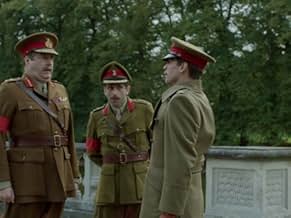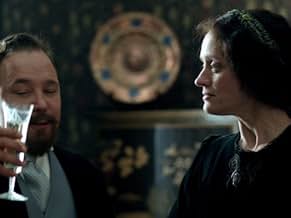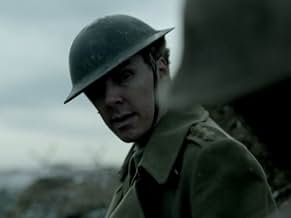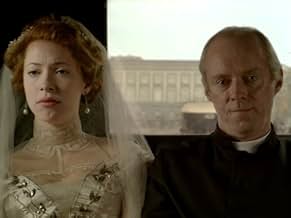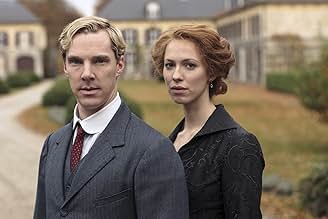Gira en torno a un triángulo amoroso entre un aristócrata inglés conservador, su mezquina esposa de la alta sociedad y una joven sufragista.Gira en torno a un triángulo amoroso entre un aristócrata inglés conservador, su mezquina esposa de la alta sociedad y una joven sufragista.Gira en torno a un triángulo amoroso entre un aristócrata inglés conservador, su mezquina esposa de la alta sociedad y una joven sufragista.
- Nominado a 5 premios Primetime Emmy
- 8 premios ganados y 36 nominaciones en total
Explorar episodios
Opiniones destacadas
I had mixed feelings when I started watching the BBC drama. Having read some comments I had some fears. One of them was that I expected the series to be some kind of copy-paste of Downton Abbey. It wasn't. It is more subtle, evolves more slowly and has an almost inaudible air of pain and suffering. I couldn't help but compare it to Maughem's "The Painted Veil" that tells the story of a couple - a flippant wife of a doctor who is intellectually superior to her but too noble and and at the same time too proud to divorce her for betrayal. This story might seem similar however it has a greater depth. It's not only a man's parade trying to stand for what he truly believes in and finding himself abandoned by life and failing as a man. It's a vivid portrayal of virtues that are believed to be outdated but are in fact so modern and thoroughly relevant to today. And that's what salvages these series from being just another costume drama.
What surprised me most about the drama was Benedict Cumberbatch's performance. He has an incredible acting prowess to play roles that are so different from him. There is no Benedict neither in Sherlock nor in Mr Tiejens. He completely vanishes within the characters he plays altering his movements, speaking, laughing, joking etc. It's interesting to note what Benedict said speaking about the role "Christopher has many admirable qualities I'd like to siphon off into my life."
I believe Mr Tiejens is one of Benedict's best roles. He uses his voice like an instrument tuning it sometimes so deep and strong and sometimes subtle and gentle. It's an astonishing performance that definitely transcends TV dramas.
What surprised me most about the drama was Benedict Cumberbatch's performance. He has an incredible acting prowess to play roles that are so different from him. There is no Benedict neither in Sherlock nor in Mr Tiejens. He completely vanishes within the characters he plays altering his movements, speaking, laughing, joking etc. It's interesting to note what Benedict said speaking about the role "Christopher has many admirable qualities I'd like to siphon off into my life."
I believe Mr Tiejens is one of Benedict's best roles. He uses his voice like an instrument tuning it sometimes so deep and strong and sometimes subtle and gentle. It's an astonishing performance that definitely transcends TV dramas.
I'm sure that HBO marketing execs were relieved that, if they were going to get behind a 5-part series based on Ford Madox Ford's complex and not terribly well known 20th-century masterpiece, at least some of it would be set in a stately home in the north of England, like that other show about the downtown abbey.
Ford's a great one for interior monologue and multiple points of view and such, but Tom Stoppard's masterly adaptation channels the great muddy river of his prose into a lively, involving narrative—though there's still enough time-shifting and flashbacking, even some Eisenstein-style montage, to do honor to Ford's avant-garde intentions. Considering what difficult material he's dealing with, it's one of the best TV adaptations ever!
Benedict Cumberbatch has always done well in period films, and he seems like the only possible choice for Christopher Tietjens, a self-styled 18th-century gentleman (the time period of the series is roughly 1908-19) and omniscient civil servant, but obstinate, brusque and arrogant as well (maybe even a little like Sherlock?). Rebecca Hall is riveting and surprisingly sympathetic as Tietjens's deceitful wife, Sylvia, and Aussie actress Adelaide Clemens is a revelation as Valentine, the virginal suffragette he meets and falls in love with in two of the series's most powerful scenes. (Tietjens and Sylvia, though usually at cross-purposes, are determined not to divorce—it's complicated .)
Tietjens is described by one of his wife's admirers as a "bloody great bolster" of a man—BC didn't have time to bulk up for the part, obviously—but he emerges as a poignant, even romantic, figure, with only the memory of the night he falls in love with Valentine to sustain him through six years of frustration, disappointment and danger. Perhaps it's easy to see why some viewers didn't find this storyline or this character very "relatable."
Long story short, '"Parade's End" isn't as accessible as an original costume drama devised for a contemporary audience, like "Downton," but it's decidedly worth watching. We didn't have a problem with BC's enunciation, but some of the dialogue, especially in the scenes with excited Welsh soldiers in the trenches, is admittedly not so easy to follow. (Next time we'll try the subtitles.) Great cinematography; kudos to the first-rate British cast, with special mention to Stephen Graham as Tietjens's fair-weather friend Macmasters and Rufus Sewell in a Pythonesque turn as a sex-crazed clergyman. An interview with Stoppard on disc two sheds some light on his process.
Ford's a great one for interior monologue and multiple points of view and such, but Tom Stoppard's masterly adaptation channels the great muddy river of his prose into a lively, involving narrative—though there's still enough time-shifting and flashbacking, even some Eisenstein-style montage, to do honor to Ford's avant-garde intentions. Considering what difficult material he's dealing with, it's one of the best TV adaptations ever!
Benedict Cumberbatch has always done well in period films, and he seems like the only possible choice for Christopher Tietjens, a self-styled 18th-century gentleman (the time period of the series is roughly 1908-19) and omniscient civil servant, but obstinate, brusque and arrogant as well (maybe even a little like Sherlock?). Rebecca Hall is riveting and surprisingly sympathetic as Tietjens's deceitful wife, Sylvia, and Aussie actress Adelaide Clemens is a revelation as Valentine, the virginal suffragette he meets and falls in love with in two of the series's most powerful scenes. (Tietjens and Sylvia, though usually at cross-purposes, are determined not to divorce—it's complicated .)
Tietjens is described by one of his wife's admirers as a "bloody great bolster" of a man—BC didn't have time to bulk up for the part, obviously—but he emerges as a poignant, even romantic, figure, with only the memory of the night he falls in love with Valentine to sustain him through six years of frustration, disappointment and danger. Perhaps it's easy to see why some viewers didn't find this storyline or this character very "relatable."
Long story short, '"Parade's End" isn't as accessible as an original costume drama devised for a contemporary audience, like "Downton," but it's decidedly worth watching. We didn't have a problem with BC's enunciation, but some of the dialogue, especially in the scenes with excited Welsh soldiers in the trenches, is admittedly not so easy to follow. (Next time we'll try the subtitles.) Great cinematography; kudos to the first-rate British cast, with special mention to Stephen Graham as Tietjens's fair-weather friend Macmasters and Rufus Sewell in a Pythonesque turn as a sex-crazed clergyman. An interview with Stoppard on disc two sheds some light on his process.
I don't like watching series or movies based on the wars but I watched this because of Benedict Cumberbatch and I have fallen in love with this series. I have not read the novels or have any idea about the writer but if the books are even half as good as the TV adaptation, they must be a must- read. Christopher Teijens is a brilliant, very committed and decent gentleman. He has a wife who cheats on him and he is love with a girl. At the backdrop is the world war 1. If you are looking for a story, there is not much of it but the true star of the show is the direction, cinematography, amazingly poetic dialogues and unblemished acting by the whole cast. The music compliments the settings and the backdrop very well. Benedict Cumberbatch has shown the world how talented he is. Flawless acting, deep emotions and superb voice modulations. Rebecca Hall and Adelaide Clemens have made the characters of Sylvia and valentine unforgettable.
Don't watch this if you are a fan of fast paced action. This is for patient, connoisseurs of literature and romantics. Watch it for intelligent viewership.
Don't watch this if you are a fan of fast paced action. This is for patient, connoisseurs of literature and romantics. Watch it for intelligent viewership.
Before "Parade's End," Rebecca Hall and Benedict Cumberbatch were last paired professionally in an unassuming romantic comedy called "Starter for 10," a film anchored by their friend James McAvoy. All three played university students. Although each turned in a good performance, the roles were not ones that required much acting range. In Parade's End, however, the roles of Sylvia and Christopher Tietjens allow both Hall and Cumberbatch to flex their considerable acting muscles. When both are in a scene, the scene is so riveting that it is hard to know which actor to watch.
Over the years, the 36-year-old Cumberbatch has built an impressive portfolio of work. He has been accurately described as a chameleon. He so completely invests himself in a role that it is sometimes hard to recognize the actor behind the character.
As Sylvia Tietjens, wife of wealthy landowner Christopher Tietjens, Hall holds her own against Cumberbatch. Her Sylvia is smart, narcissistic, beautiful, lusty, manipulative, and utterly fascinating. Her rival, suffragette Valentine Wannop, pales in comparison. While the younger Valentine is sweet, loyal, and plucky, she doesn't have Sylvia's fire.
Which woman will Christopher choose? You'll have to watch the series to find out. Along the way, you'll enjoy not only the performances of the three principal actors, but also the performances of a wonderful ensemble of able actors, including Rupert Everett, Anne-Marie Duff (coincidentally, the wife of James McAvoy, who joined Hall and Cumberbatch in "Starter for 10"), and others.
Over the years, the 36-year-old Cumberbatch has built an impressive portfolio of work. He has been accurately described as a chameleon. He so completely invests himself in a role that it is sometimes hard to recognize the actor behind the character.
As Sylvia Tietjens, wife of wealthy landowner Christopher Tietjens, Hall holds her own against Cumberbatch. Her Sylvia is smart, narcissistic, beautiful, lusty, manipulative, and utterly fascinating. Her rival, suffragette Valentine Wannop, pales in comparison. While the younger Valentine is sweet, loyal, and plucky, she doesn't have Sylvia's fire.
Which woman will Christopher choose? You'll have to watch the series to find out. Along the way, you'll enjoy not only the performances of the three principal actors, but also the performances of a wonderful ensemble of able actors, including Rupert Everett, Anne-Marie Duff (coincidentally, the wife of James McAvoy, who joined Hall and Cumberbatch in "Starter for 10"), and others.
Not since A Dance to the Music of Time has such a stellar cast been allied to such an artful and unusual script.
Ford Madox Ford is not a popular novelist. His work often approaches its subjects on an elliptical curve, his principal characters are seldom in the mainstream of society, forming odd relationships, requiring his audience to assimilate their understanding of them over the course of a whole work rather than categorise from their experience (or jump to conclusions based on genre). This explains why we don't see his work adapted very often. Or even at all.
Susanna White and Tom Stoppard have both grasped the nettle of demonstrating this sideways approach, though I'm not sure quite so many kaleidoscopic shots were necessary to drive the point home. Benedict Cumberbatch joins in, underlining his character's isolation with some rather off-putting facial gestures. Ronald Hines played Tietjens in the now lost 1960's adaptation and casting to type may have worked better than struggling with toning down the matinée idol status Cumberbatch has acquired since hitting Sherlock Holmes out of the park. Maybe if he and Stephen Graham had swapped roles the other characters might have found it easier to deal with Tietjens' self-enforced oddity but that may have impaired Ford's central point, beautifully delivered as the the climax to Episode 4.
But acting idiosyncrasies cannot mask the quality of the fabulous script or the overall adaptation which has a towering performance from Rebecca Hall and glittering additions from Rufus Sewell, Rupert Everett, Miranda Richardson, Roger Allam, Ann-Marie Duff and beautiful, note-perfect newcomer Adele Clemens.
With so much glossy soap about, it is extremely refreshing to have high quality, thought-provoking, challenging drama this good whatever the lead chooses to do with his jaw muscles.
A keeper.
Ford Madox Ford is not a popular novelist. His work often approaches its subjects on an elliptical curve, his principal characters are seldom in the mainstream of society, forming odd relationships, requiring his audience to assimilate their understanding of them over the course of a whole work rather than categorise from their experience (or jump to conclusions based on genre). This explains why we don't see his work adapted very often. Or even at all.
Susanna White and Tom Stoppard have both grasped the nettle of demonstrating this sideways approach, though I'm not sure quite so many kaleidoscopic shots were necessary to drive the point home. Benedict Cumberbatch joins in, underlining his character's isolation with some rather off-putting facial gestures. Ronald Hines played Tietjens in the now lost 1960's adaptation and casting to type may have worked better than struggling with toning down the matinée idol status Cumberbatch has acquired since hitting Sherlock Holmes out of the park. Maybe if he and Stephen Graham had swapped roles the other characters might have found it easier to deal with Tietjens' self-enforced oddity but that may have impaired Ford's central point, beautifully delivered as the the climax to Episode 4.
But acting idiosyncrasies cannot mask the quality of the fabulous script or the overall adaptation which has a towering performance from Rebecca Hall and glittering additions from Rufus Sewell, Rupert Everett, Miranda Richardson, Roger Allam, Ann-Marie Duff and beautiful, note-perfect newcomer Adele Clemens.
With so much glossy soap about, it is extremely refreshing to have high quality, thought-provoking, challenging drama this good whatever the lead chooses to do with his jaw muscles.
A keeper.
¿Sabías que…?
- TriviaBenedict Cumberbatch claimed that his character of Christopher Tietjen was one of the more admirable he has ever played. He claimed "[Christopher] has many admirable qualities I'd like to siphon off into my life."
- ErroresSylvia and Bobbie smoke cigarettes, but several others certainly would have been smokers, including the Ladies Macmaster, Wonnop, Satterthwaite, Marie-Leonie, and Claudine.
- ConexionesFeatured in The Wright Stuff: Episode #17.165 (2012)
Selecciones populares
Inicia sesión para calificar y agrega a la lista de videos para obtener recomendaciones personalizadas
- How many seasons does Parade's End have?Con tecnología de Alexa
Detalles
- Fecha de lanzamiento
- Países de origen
- Idioma
- También se conoce como
- Geçit Töreni Sonu
- Locaciones de filmación
- Duncombe Park, Helmsley, York, North Yorkshire, Inglaterra, Reino Unido(Groby Hall: Tietjens family's country estate)
- Productoras
- Ver más créditos de la compañía en IMDbPro
Contribuir a esta página
Sugiere una edición o agrega el contenido que falta

Principales brechas de datos
By what name was Parade's End (2012) officially released in India in English?
Responda

